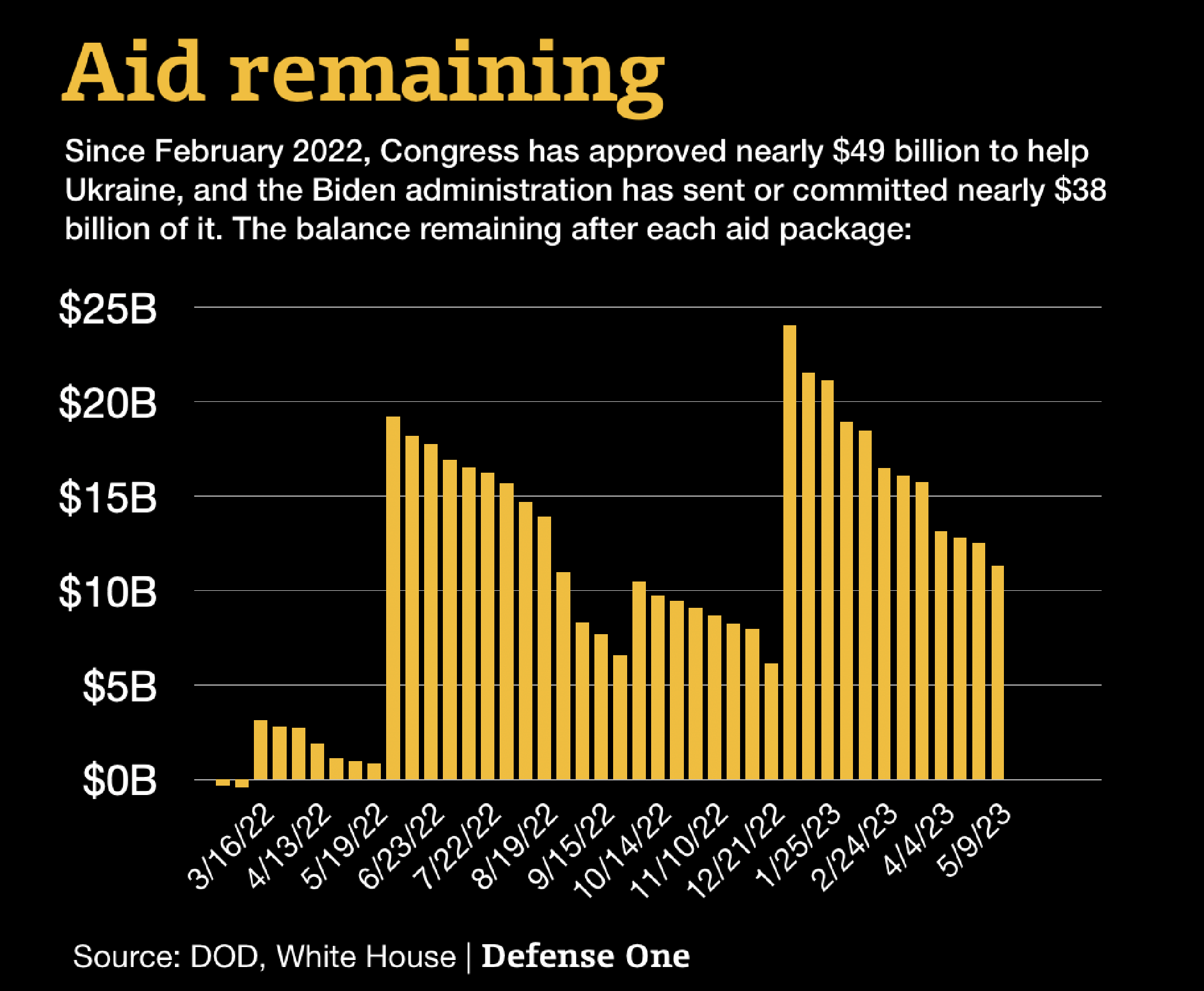
On January 25, 2023, President Joe Biden, with Defense Secretary Lloyd Austin, announces the upcoming transfer of U.S. Abrams tanks to Ukraine. ANDREW CABALLERO-REYNOLDS/AFP via Getty Images
US Aid to Ukraine On Track to Run Out in September
In Washington, some are beginning to wonder what Biden is waiting for.
The flow of U.S. military aid so vital to Ukraine’s defense will slow—or even stop—by August unless Congress approves new funds, according to a Defense One review of Pentagon data.
Since the Russian invasion of February 2022, lawmakers have approved the disbursement of $48.9 billion in military aid to Ukraine. As of May 15, $36.4 billion of that total has been delivered, contracted, or otherwise committed. At the average rate of disbursement since the invasion began, the remaining $11.3 billion will run out in about four months.
Ukraine may desperately need replenishment at just that moment. The looming campaign to dislodge Russian forces is expected to require a heavy expenditure in lives and equipment.
Congress may approve a fifth package of supplemental spending, adding to the ones it passed last year in March, May, September, and December. But the Biden administration has yet to formally request one, and officials are keeping mum.
The Defense Department directed questions about a new supplemental to the National Security Council. The NSC and White House did not respond to multiple emails and phone calls.

The potential squeeze worries some in Congress and Ukraine, and highlights the administration’s political balancing act.
"My belief, based on some conversations, is that the administration is planning on moving ahead with a serious aid package this calendar year," said John Herbst, a former U.S. Ambassador to Ukraine.
But political considerations are at play, said Mark Cancian, a senior advisor at the Center for Strategic and International Studies. “They don't want to go in too high with all the attention and pushback a big number would entail,” before they have to, he said.
A vocal minority of Republicans and, to a lesser extent, Democrats, have pushed against White House policies in Ukraine. On April 20, a group of 17 Republicans signed a letter calling for an end to aid to Ukraine. Some progressive Democrats issued and then retracted a letter calling for direct peace talks between the U.S. and Russia.
American public support for the war is also flagging. Both Democrat and Republican voters’ willingness to pay for the war has fallen, according to a poll by the Brookings Institution think tank. For example, the share of Democratic respondents willing to support Ukraine even if it meant higher energy prices dipped from 80% last October to 65% last month.
Some lawmakers say that it’s the administration, not Congress, that’s not taking aid to Ukraine seriously enough.
One senior congressional aide complained of a perceived lack of planning in the White House beyond Ukraine’s much-mooted counter-offensive.
The administration needs to do the “due diligence of planning for what happens after the spring offensive,” the aide said. “A lot of folks on the Hill presume that the administration is hoping that after the spring offensive, the conditions for some kind of negotiations will return.”
Another senior congressional aide forecast that the administration would have little patience for continued fighting in Ukraine if the counteroffensive failed.
“I don’t think Biden wants this during the campaign,” the aide said.
The president announced his re-election bid on April 25.
The aide said the White House has not yet included interested members of Congress on discussions over a new supplemental bill. Another aide said that lawmakers had been asking for information on the next supplemental but got “radio silence.”
Despite White House worries that Republicans, having won back the House majority, might torpedo a new Ukraine spending bill, previous supplementals have passed with the support of about three-quarters of GOP lawmakers.
Republican House Speaker Kevin McCarthy, who campaigned on promises to approve no “blank check” for Ukraine, affirmed on Monday his support for the country and blasted Russia for its “killing of the children '' there.
Luke Coffey, a senior fellow at the Hudson Institute, said the Biden administration has yet to invest sufficient political capital in explaining to Americans why they should support Ukraine. “Where's the prime time address by President Biden, explaining to the American people why this is in our interest to support Ukraine?” Coffey said.
The administration instead frequently says they’re supporting Ukraine to defend the “rule-based international order,” a term, Coffey said, few Americans would even be aware of.
“They're giving Ukraine just enough to survive,” Coffey said. “There's a lot of back-slapping and congratulating over one Patriot missile battery.”
In the meantime, the ambiguity leaves at least some Ukrainian officials worried about U.S. intentions. A lack of financial support would be “very dangerous,” Oleksandra Ustinova, head of the Holos party faction in the Ukrainian parliament, said on April 17 at a German Marshall Fund event in Washington, D.C.
Washington should not assume that the war could end with a ceasefire that leaves Russian troops on Ukrainian territory, Ustinova said.
“We did that,” she said, referring to diplomatic negotiations before the start of Russia’s full-scale invasion in February 2022. “It doesn't work.”




